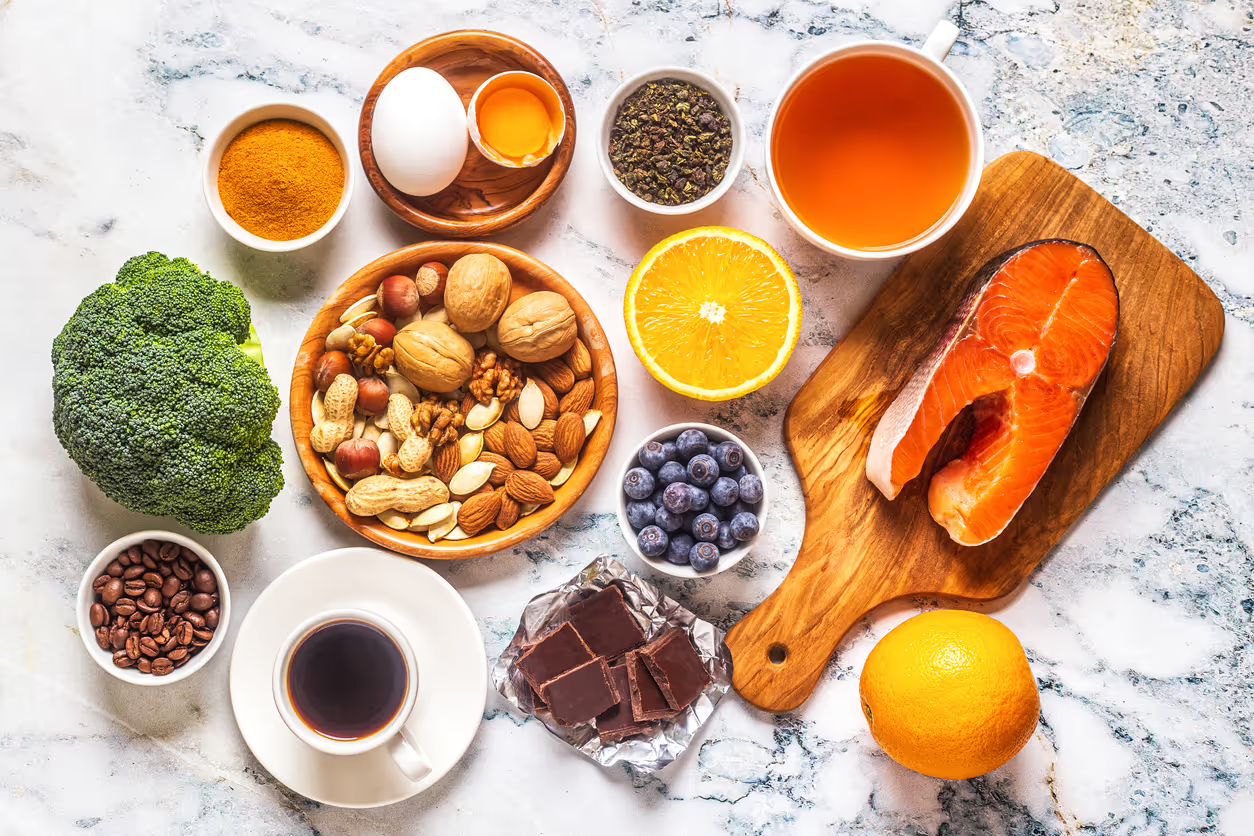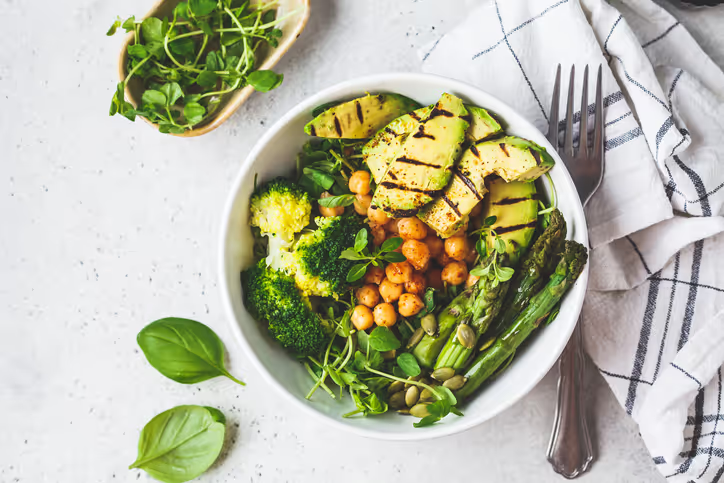When it comes to guidance surrounding health, wellness, and tackling obesity, there is an online “infodemic.” The latest, ‘eat this, not that’ diet trends can be overwhelming and ultimately unsustainable long-term. However, there are research-based obesity-management guidelines when it comes to healthy foods to promote weight loss with the ultimate goal of weight maintenance and overall wellness.
Do you have to watch what you eat when losing weight?
When you are trying to lose weight, the quality of nutrients in the foods you eat are just as important as the quantity. It’s also important to consider the nutrients of what you drink. Often, the focus with diets is counting calories and simply trying to eat less. Many main-stream diets don’t take into consideration the nutrient profile of foods, which are important to promote overall health and wellness. Inadequate nutrient intake through over-restrictive eating may lead to serious health consequences. Eating wholesome, nutritious foods is essential for maintaining good health and supporting a healthy weight.
What foods should you eat for weight loss?
The weight loss friendly foods list below provides real-life guidance on foods that are nutrient-dense and satisfying. This resource can be used at home by individuals and families in addition to in the healthcare setting for practitioners supporting individuals with their weight loss journey.
What are the best fruits to eat that support weight loss?
Choose whole fruits vs. fruit juices such as:
Apples: On average one large apple contains 116 calories and 5.4 grams of fiber. Apples offer flavor and promote fullness at a low-calorie cost.
Berries: Berries are a nutrient-packed superfood, high in fiber and loaded with Vitamin C and Vitamin K. Berries may also aid in lowering inflammation, decreasing cholesterol levels and blood pressure.
Melons: Melons are low in calories but high in water content, and will help you stay well hydrated while attempting to lose weight. One cup of melon, such as cantaloupe, provides just 46-61 calories!
Oranges: Like all fruits in the citrus fruit family, oranges are high fiber, low in calories, and can assist in promoting satiety. Research suggests that eating whole fruits vs. drinking fruit juices, such as orange juice, may lead to improved fullness and reduced calorie consumption.
What are the best vegetables to eat that support weight loss?
The Dietary Guidelines for Americans recommends that adults consume at least 2 ½ cups of vegetables a day. For reference, one cup of raw or cooked vegetables, such as broccoli or cauliflower is equal to a 1-cup vegetable serving. Aim to fill half your plate with non-starchy vegetables at lunch and dinner. Choose vegetables packed with vitamins and minerals, high in fiber and low in calories, such as:
Cauliflower: A highly versatile vegetable, cauliflower can be prepared in many other ways besides just steaming. Try roasted cauliflower florets or cauliflower, “steaks.” Cauliflower can be substituted for mashed potatoes and cream sauces. It’s also a nice rice alternative and can be incorporated into pizza crusts!
Brussels sprouts: A low calorie, high fiber veggie, packed with Vitamin C. Try roasting brussels in the oven tossed with a touch of sweetness such as dried fruit or a savory element such as parmesan cheese or sliced olives.
Kale: A nutrient powerhouse, packed with Vitamin K, calcium, iron and antioxidants. A yummy green for salads. Meal prep tip - kale is a hearty green that doesn’t wilt quickly. This makes kale a good lunch green to plan and pack ahead for the week.
Arugula: Another nutrient-dense green. High in fiber and phytochemicals which aid in your body’s immune functioning and may reduce inflammation. Arugula is unique with its peppery undertones. Use arugula raw for salads or as a garnish on top of pizzas, sandwiches and wraps.
Bok choy: Packed with essential vitamins, minerals and antioxidants, bok choy is a popular ingredient in Asian cuisine. Bok choy can be consumed raw to provide that crunch factor alongside your favorite dips such as hummus. Shred bok choy in salads or incorporate it into a stir fry or soup.
Fresh, frozen or canned oroduce?
The Dietary Guidelines for Americans and MyPlate.gov recommends filling half your plate with a variety of fruits and vegetables. Fresh, frozen, or canned fruits and vegetables all count! Look for canned fruits packed in water vs. sugar-based syrups. Choose frozen vegetables that are not prepared in high-calorie sauces. Eating right doesn’t have to be complicated, according to Eatright.org.
Research suggests that the nutrient profile of canned and frozen fruits and vegetables are, in fact, similar to fresh. In some instances, frozen produce may be higher in nutrient- density than fresh due to a lower processing time after harvest.
What are the best meats and seafood to eat that support weight loss?
Lean cuts of meat and fish can play a role in a balanced diet to promote weight loss. Lean meats are packed with protein, and fish such as salmon and tuna provide a healthy fat source including omega-3 fatty acids to support brain health.
The USDA recommends filling ¼ of your plate with a lean protein source. See examples below:
Chicken: Contains approximately 19 grams of protein per 3 oz serving. Chicken is one of the most versatile sources of lean protein. Jazz up your chicken by roasting, glazing, marinating, stuffing, or tossing chicken into salads, soups and stews.
Beef: Contains approximately 17 grams of protein per 3 oz serving. Despite red meat’s negative reputation, consuming lean beef in moderation provides an excellent source of both protein and iron.
Ground turkey: Contains approximately 18 grams of protein per 3 oz serving. Ground turkey is an excellent alternative to ground beef, just make sure to choose 85% lean or higher varieties. Ground turkey is another adaptable ingredient that can be used to make lean turkey burgers, tacos, soups or stews!
Salmon: Contains 19 grams of protein per 3 oz serving. The Dietary Guidelines for Americans recommends at least 8 oz of fish per week for adults. Consuming fish as a regular part of your diet provides heart health benefits. Salmon, in particular, is a rich source of omega-3 fatty acids which have been shown to help prevent heart disease and stroke.
Canned tuna: Contains 20 grams of protein per 3 oz serving. Similar to salmon, tuna is high in lean protein and a rich source of healthy fat. Canned tuna is a budget-friendly alternative to fresh fish. Tuna can be served blended into tuna burgers, tossed into a healthy tuna salad or as a snack on top of whole grain crackers.
What are good plant-based proteins that support weight loss?
Plant based proteins are not just for vegetarians. They can be incorporated into a balanced diet as a rich source of protein and high source of fiber to support weight loss. Here are some examples of foods rich in plant-based protein:
Legumes: An affordable option to keep on hand in your pantry, legumes contain about 100-125 calories per ½ cup and approximately 8 grams each of protein and fiber. Legumes can be incorporated into a cold bean salad prepared for the week, into soups/stews/chilis, or as a part of a meatless burger recipe.
Nuts/seeds: Although they are often ruled out as part of a weight loss program due to being calorically-dense, nuts and seeds are a nutrient powerhouse that can be included in moderation. One serving of nuts/seeds is approximately 1⁄4 cup. The healthy fat content of nuts have been shown to support heart health and reduce inflammation.
How Form Health can help you reach your weight loss goals?
Form Health is an online medical weight loss practice that offers a comprehensive approach to your weight loss journey. Form Health offers a dedicated team of experts, including board certified Physicians and Registered Dietitians, who use evidence-based medical approaches to help their patients achieve their weight loss goals. Form Health dietitians create individualized plans for each patient based on their unique needs and lifestyle.
Interested in learning more about how Form Health can partner with you on your weight loss journey? Take our quiz to find out if you are eligible.




